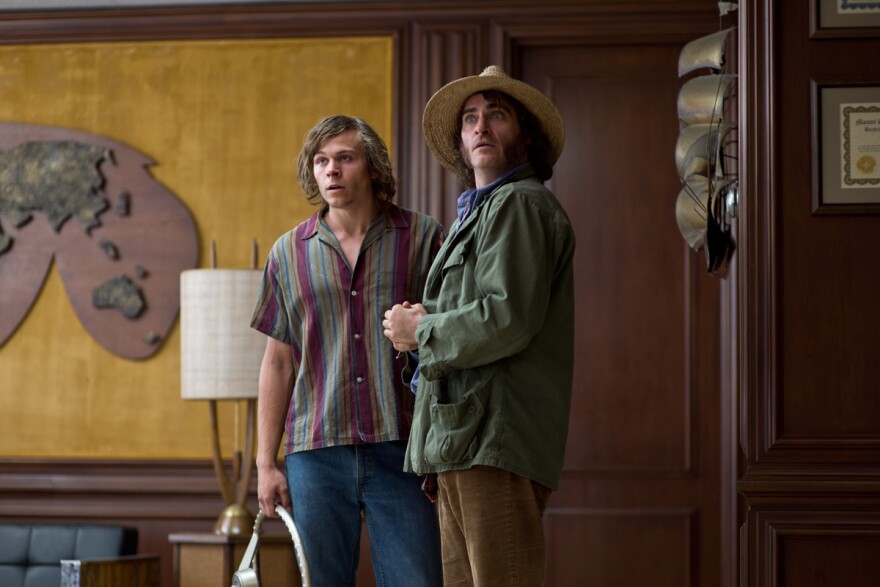Maybe, Paul Thomas Anderson's Inherent Vice is about how stories are unreliable and empty. The film is full of stories, and stories within stories and stories about stories. Every time private investigator Doc Sportello bumps into another character, he gets a story, which leads to another character with a story to tell.
But Inherent Vice winds up where it starts, at least geographically, so it takes you in a big circle. At the end you might wonder whether you've really been anywhere at all.
At the beginning, Doc Sportello's (Joaquin Phoenix) girlfriend Shasta (Katherine Waterston) has run off with the slimy real estate developer Mickey Wolfmann (Eric Roberts). That leads Doc to bizarre massage parlors and home swimming pools, dark alleys, warehouses and police stations. Doc and a good 80 percent of the population of the film are stoned most of the time. Doc is a rumpled guy – the time is the 1970s in Los Angeles – so he wears shaggy hair with muttonchop sideburns and he rarely shaves. He usually wears shoes, and his arch rival, a police detective called "Bigfoot" (Josh Brolin) thinks of Doc as a degenerate hippie.
The movie dwells in the land of caricature. Doc is way beyond simple grubby; the very young women in the picture dress and slither like old Playboy drawings of male fantasies about young sexpots. Mickey Wolfmann's wife looks like her plastic surgeries have had plastic surgery. Characters bear names like Petunia Leeway and Dr. Buddy Tubeside, and the movie's a parade of celebrity character actors – Martin Short, Reese Witherspoon, Owen Wilson, Maya Rudolph.
Inherent Vice offers up two and a half hours of parody and light irony. Director Paul Thomas Anderson exaggerates speech patterns, language, events, how people walk and wear their hair.
The picture spoofs classic film noir. Like many of those films, Inherent Vice has a narrator, but while the film noir narrator is usually the main character describing his downfall, this narrator is a woman and a secondary character who knows some things but not others. Like the noir detective, Doc tries to reassemble a world that's crumbled into chaos and deception, but Doc finally doesn't reshape anything, because nothing sticks together or matters.
It's a clever, playful film. The developer is described as "technically Jewish, but he wants to be a Nazi," and a black ex-con talks about the shared interests of the Crips and the Aryan Brotherhood. Doc's telephone glows in the hideous avocado green that you can still find on old refrigerators and he drives a Dodge Dart. The movie is also beautifully crafted, with tricky colors and shadows. Cinematographer Robert Elswit changes Joaquin Phoenix's face completely when the story moves from the dark indoor shots at night into shocking daylight.
But Inherent Vice is also a film without direction; its stories really don't lead anywhere. It's driven by an interesting paranoia, and the sense that the stoned world at least is better than the straight world.
This kind of parody and spoofing finally has no purpose. It takes the ancient pattern of the detective's search and makes it pointless. The movie takes a good half-hour searching for an ending, which means it had no direction to begin with. If you know film noir at all, there's a lot to chuckle at as you recognize the teasing of the conventions of old noir. Doc is a soul lost in a meaningless world, but simply to joke about that that is a paltry achievement.
So the movie winds up mocking the anxieties that drove noir in the '40s and '50s. Doc's world is full of clowns, characters who exist for the sake of being recognized as silly clichés. There's no virtue in feeling alienated from the stuff of a movie, of looking at it as if it's just curiosities spread on a sheet in a flea market, or worse, feeling superior to things judged as silly.
You come out of Inherent Vice unscathed. That's not noir.






